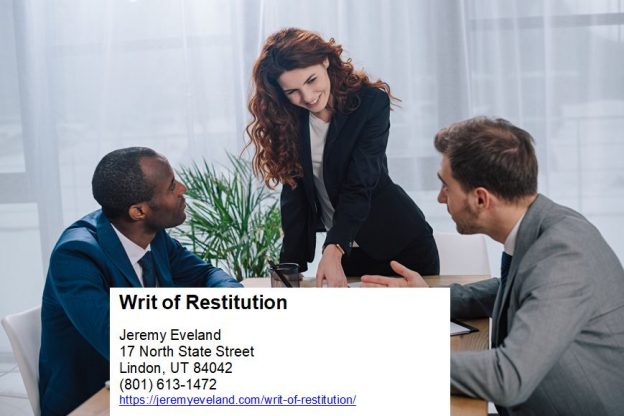When it comes to leasing property in the state of Utah, having a clear understanding of the landlord-tenant laws is crucial. Whether you are a landlord seeking guidance on rental agreements and eviction procedures, or a tenant wanting to know your rights and responsibilities, familiarity with these laws is essential to ensure a smooth and lawful relationship between both parties. In this article, we will provide you with comprehensive insights into Utah’s landlord-tenant laws, empowering you with the knowledge needed to navigate the intricacies of this legal landscape.
Rights and Responsibilities of Landlords
As a landlord in the state of Utah, you have certain rights and responsibilities that you must adhere to in order to maintain a legal and fair rental agreement. Understanding these rights and responsibilities is essential for a smooth and successful landlord-tenant relationship.
Discrimination Laws
In Utah, landlords are prohibited from engaging in any form of discrimination against potential tenants based on protected classes, such as race, color, religion, sex, national origin, familial status, or disability. It is important to ensure that your rental practices comply with these laws to avoid legal consequences.
Lease Agreements
One of the key responsibilities of a landlord is to establish a clear and comprehensive lease agreement with your tenants. This agreement should outline important details such as the rent amount, due date, length of the lease term, pet policies, and any other relevant terms and conditions. It is crucial to properly draft and execute this agreement in order to protect your rights as a landlord.
Security Deposits
Collecting a security deposit is a common practice among landlords in Utah. This deposit acts as a form of financial protection in case the tenant causes damage to the rental unit or fails to fulfill their obligations under the lease agreement. However, it is important to understand the legal restrictions and requirements surrounding security deposits, such as the maximum amount that can be collected and the procedures for returning the deposit at the end of the tenancy.
Access to Rental Unit
While you have the right to access the rental unit for purposes such as inspections, repairs, or showing the property to potential tenants, it is crucial to respect your tenant’s right to privacy. In Utah, landlords are typically required to provide reasonable notice to tenants before entering the rental unit, except in cases of emergency.
Repairs and Maintenance
Maintaining the rental property in a safe and habitable condition is an important responsibility of landlords. This includes ensuring that all essential utilities (such as water, electricity, and heat) are in proper working order, addressing any necessary repairs in a timely manner, and complying with all applicable health and safety codes. Failure to fulfill these obligations can result in legal consequences and potentially damage your landlord reputation.
Rights and Responsibilities of Tenants
As a tenant in Utah, it is important to understand your rights and responsibilities to have a positive and successful rental experience.
Discrimination Protection
Just as landlords are prohibited from discriminatory practices, tenants in Utah are protected against discrimination based on factors such as race, color, religion, sex, national origin, familial status, or disability. If you believe you have been discriminated against during the rental process, it is important to know your rights and seek appropriate legal assistance.
Lease Agreements
Signing a lease agreement is a crucial step for tenants in order to establish the terms and conditions of the rental arrangement. It is essential to carefully review the lease agreement and make sure you fully understand your obligations as a tenant, including payment of rent, maintenance responsibilities, and any restrictions or rules outlined in the agreement.
Security Deposits
As a tenant, you may be required to pay a security deposit when renting a property. It is important to understand the terms and conditions surrounding the security deposit, including the maximum amount that can be collected and the procedures for its return at the end of the tenancy. Keeping thorough documentation of the property’s condition upon move-in can help protect your rights when it comes to the return of your deposit.
Right to Privacy
While landlords have the right to access the rental unit under certain circumstances, tenants in Utah also have the right to privacy. Landlords are generally required to provide reasonable notice before entering the rental unit, unless there is an emergency situation. Respecting your tenant’s privacy is essential for maintaining a respectful and legally compliant landlord-tenant relationship.
Reporting Repairs
If you encounter any maintenance issues or repairs that are the responsibility of the landlord, it is important to promptly report them. Utah’s landlord-tenant laws typically require landlords to address necessary repairs within a reasonable time frame. Documenting your requests and maintaining open communication with your landlord can help ensure that repairs are made in a timely manner.

Eviction Process
No matter how diligent and careful you are as a landlord or tenant, situations may arise where eviction becomes a necessary course of action. Understanding the eviction process is essential for both parties involved.
Valid Reasons for Eviction
In Utah, landlords can only evict tenants for valid reasons, such as failure to pay rent, violation of the lease agreement, or engaging in illegal activities on the premises. It is crucial to consult with an attorney to ensure that you have valid grounds for eviction and to follow the proper legal procedures.
Notice Requirements
Before initiating the eviction process, landlords are typically required to provide tenants with a written notice, detailing the reasons for eviction and any steps that can be taken to remedy the situation. The length of the notice period will depend on the specific circumstances and the terms outlined in the lease agreement.
Court Proceedings
If the tenant does not comply with the notice and refuses to vacate the premises, landlords may need to initiate legal proceedings. This typically involves filing a lawsuit in court and presenting evidence to support the eviction. It is advisable to consult with an attorney to navigate the complexities of the eviction process and ensure compliance with all legal requirements.
Writ of Restitution
If the court grants an eviction order, the tenant will be served with a writ of restitution, which instructs them to vacate the premises within a specific time frame. If the tenant fails to comply, law enforcement may be involved to enforce the eviction.
Tenant’s Rights during Eviction
Even during the eviction process, tenants are entitled to certain rights and protections. It is important for both landlords and tenants to understand these rights to ensure a fair and legally compliant eviction process.
Rent and Rent Increases
Rent plays a significant role in the landlord-tenant relationship. Understanding the laws and regulations regarding rent is essential for both parties involved.
Rent Payments
As a tenant, it is your responsibility to pay rent on time and in accordance with the terms outlined in the lease agreement. Failure to do so can result in legal consequences, including eviction. It is important to keep thorough records of rent payments, such as receipts or bank statements, to protect your rights.
Late Fees
Landlords in Utah have the right to charge late fees for overdue rent, as long as these fees are reasonable and outlined in the lease agreement. It is important to review the terms of your lease to understand any potential late fees that may apply.
Rent Increases and Notice
Landlords generally have the right to increase the rent amount upon lease renewal or at certain intervals, as long as proper notice is provided to tenants. In Utah, this notice typically needs to be given in writing and within a specific time frame before the increase takes effect. Understanding and abiding by these requirements is crucial for both landlords and tenants.
Limitations on Rent Increases
While landlords have the right to increase rent, there are limitations and restrictions in place to protect tenants. In Utah, rent increases cannot be discriminatory or retaliatory, and they must be reasonable based on market conditions and comparable rental units. Knowing your rights as a tenant can help you navigate rent increases and ensure a fair rental agreement.

Fair Housing Laws
Fair housing laws are in place to protect individuals from discrimination in the housing market. Understanding these laws is essential for both landlords and tenants in Utah.
Protected Classes
Fair housing laws in Utah protect individuals from discrimination based on certain protected classes, including race, color, religion, sex, national origin, familial status, or disability. It is illegal for landlords to engage in discriminatory practices during the rental process or throughout the tenancy.
Prohibited Practices
In addition to protecting individuals from discrimination, fair housing laws also prohibit certain practices that may have a discriminatory effect. These include practices such as refusing to rent, setting different terms or conditions, providing different services or facilities, or engaging in any other actions that unfairly treat individuals based on their protected class status.
Reasonable Accommodations
Landlords have a responsibility to provide reasonable accommodations for tenants with disabilities. This may include making modifications to the rental unit or common areas to ensure accessibility, when such modifications do not pose an undue burden on the landlord. Tenants with disabilities have the right to request these accommodations, and landlords are required to consider and respond to such requests in a timely manner.
Fair Housing Complaints
If you believe you have been a victim of housing discrimination, it is important to know your rights and take appropriate action. In Utah, individuals can file a fair housing complaint with the Utah Anti-Discrimination and Labor Division. Seeking legal representation is advisable to navigate the complaints process and protect your rights.
Termination of Lease
The termination of a lease agreement is a significant event that requires proper understanding and adherence to legal requirements in Utah.
Lease Termination by Tenant
Tenants in Utah generally have the right to terminate a lease agreement upon proper notice as outlined in the lease or as required by state law. The length of the notice period will depend on the terms specified in the lease agreement. It is important to review the lease agreement and understand your obligations before terminating the lease.
Lease Termination by Landlord
Landlords in Utah can terminate a lease agreement under certain circumstances, such as non-payment of rent, violation of the lease terms, or other valid reasons for eviction. It is important to consult with legal counsel to ensure compliance with all legal requirements and avoid any potential legal consequences.
Notice Requirements
Both landlords and tenants must adhere to specific notice requirements when terminating a lease agreement. The length of the notice period will depend on the circumstances and the terms specified in the lease. It is important to provide written notice and maintain proper documentation for legal protection.
Early Lease Termination
In some cases, tenants may need to terminate a lease agreement before the agreed-upon end date. Early lease termination can have legal and financial implications, and it is important to consult with an attorney to understand your rights and obligations in such situations.
Dispute Resolution
Disputes can arise between landlords and tenants, and it is essential to have mechanisms in place to resolve these disputes in a fair and efficient manner.
Mediation
Mediation is a voluntary process in which a neutral third party assists in facilitating communication and negotiation between the landlord and tenant. Mediation can be an effective alternative to legal proceedings, as it allows both parties to work together to reach a mutually agreeable resolution.
Small Claims Court
If informal resolution methods are unsuccessful, small claims court provides a legal avenue for resolving landlord-tenant disputes involving relatively small amounts of money. Small claims court is designed to be accessible and efficient, allowing both parties to present their case before a judge who will make a legally binding decision.
Attorney Representation
In more complex or contentious disputes, it may be necessary for either the landlord or tenant to seek legal representation. An attorney can provide valuable advice, help navigate the legal process, and advocate for your rights and interests in court or during negotiations.
Legal Aid Services
If you are facing a dispute with your landlord or tenant and cannot afford an attorney, it is worth exploring legal aid services in your area. These services provide free or low-cost legal assistance to individuals who meet certain income and eligibility requirements.
Retaliation and Retaliatory Evictions
Retaliation by landlords against tenants for exercising their rights is illegal under Utah’s landlord-tenant laws. Understanding the concept of retaliation and how to recognize it is important for both landlords and tenants.
Protected Actions
Retaliation laws protect tenants from adverse actions by landlords in response to certain protected actions. These actions may include reporting health or safety code violations, requesting necessary repairs, joining a tenant association, or exercising any other rights given by Utah’s landlord-tenant laws.
Recognizing Retaliation
Retaliation may take various forms, including eviction, rent increases, or harassment. It is important for both landlords and tenants to be aware of the signs of retaliation and take appropriate action to protect their rights.
Filing a Complaint
If you believe you have been a victim of retaliation, it is important to document the incidents and gather evidence to support your claim. Filing a complaint with the appropriate state agency or seeking legal representation can help protect your rights and ensure that appropriate actions are taken against the retaliating party.

Property Maintenance Standards
Maintaining a safe and habitable living environment is a responsibility shared by both landlords and tenants. Understanding the property maintenance standards set forth by Utah law is essential for ensuring compliance and a positive rental experience.
Safety and Sanitation
Landlords in Utah are required to maintain rental properties in a safe and sanitary condition. This includes ensuring that the property meets all applicable building codes, providing proper waste disposal facilities, and addressing any health or safety hazards promptly.
Required Utilities
Landlords must provide necessary utilities, such as water, electricity, and heat, unless otherwise agreed upon in the lease agreement. It is important for tenants to understand their rights and responsibilities regarding utilities and to promptly report any interruptions or issues to the landlord.
Common Area Maintenance
If you reside in a rental property with shared common areas, such as hallways, lobbies, or laundry facilities, it is the landlord’s responsibility to maintain and ensure the safety of these areas. Tenants should report any maintenance or safety concerns to the landlord in a timely manner.
Penalties for Non-Compliance
Failure to comply with property maintenance standards can result in legal consequences for landlords. Tenants also have certain rights and remedies if their landlord fails to meet their obligations. Understanding the legal remedies available and seeking appropriate legal advice is important for both parties involved.
Mobile Home Park Laws
If you live in a mobile home park in Utah, there are specific laws and regulations that apply to both mobile home park owners and tenants.
Mobile Home Park Regulations
Mobile home park owners in Utah must comply with specific regulations regarding the management and operation of their parks. These may include requirements such as proper maintenance and repair of common areas, adherence to health and safety codes, and fair rental practices.
Rights and Responsibilities of Mobile Home Park Owners
Mobile home park owners have certain rights and responsibilities, such as collecting rent, maintaining park facilities, and enforcing park rules and regulations. However, they must also respect the rights of tenants and comply with applicable laws and regulations.
Rights and Responsibilities of Mobile Home Park Tenants
Mobile home park tenants have specific rights and responsibilities, including the right to a safe and habitable living environment, protection against unfair eviction, and the right to participate in park management decisions. Tenants must also comply with park rules and regulations, pay rent on time, and maintain their mobile homes and lots.
Understanding these rights and responsibilities is essential for both mobile home park owners and tenants in order to maintain a harmonious and legally compliant living environment.
After submitting the article, please write 5 Frequently Asked Questions (FAQs) about landlord-tenant laws in Utah and provide short answers for each FAQ.
Frequently Asked Questions (FAQs)
Q: Can a landlord refuse to rent to me based on my race?
A: No, it is illegal for a landlord in Utah to discriminate against potential tenants based on their race or any other protected class, such as color, religion, sex, national origin, familial status, or disability.
Q: How much notice does a landlord need to provide before increasing the rent?
A: In most cases, landlords in Utah must provide at least 15 days’ written notice before increasing the rent. However, if the lease agreement specifies a different notice period, that should be followed.
Q: Can a landlord enter my rental unit without notice?
A: Generally, landlords in Utah are required to provide at least 24 hours’ written notice before entering a rental unit. However, there are exceptions for emergencies that require immediate access, such as a gas leak or a fire.
Q: What should I do if my landlord refuses to make necessary repairs?
A: If your landlord fails to address necessary repairs, it is important to communicate your concerns in writing and keep a record of all correspondence. If the repairs still go unaddressed, you may have legal remedies such as withholding rent or terminating the lease agreement.
Q: Can a landlord evict me without a valid reason?
A: No, landlords in Utah can only evict tenants for valid reasons, such as failure to pay rent, violation of the lease agreement, or engaging in illegal activities on the premises. Landlords must follow proper legal procedures and provide appropriate notice before initiating an eviction.



